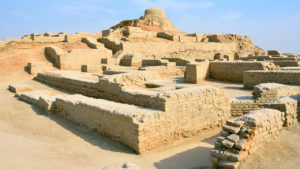
Mohenjo-daro is an ancient Indus Valley Civilization city built around 2600 BCE that was abandoned after 1900 BCE. (Photo credit: suronin / Shutterstock.com)
WOODS HOLE – More than 4,000 years ago, the Harappa culture flourished in the Indus River Valley in what is now modern Pakistan and northwestern India, but they were forced to leave their sophisticated cities for the Himalayan foothills and researchers believe it was due to the effects of climate change.
A new study from the Woods Hole Oceanographic Institution has found evidence that climate change may have likely driven the Harappans to resettle far away from the Indus Valley floodplains.
Beginning around 2500 BCE, a shift in temperatures and weather patterns over the valley caused summer monsoon rains to gradually dry up, making agriculture difficult or impossible, according to Liviu Giosan, a WHOI geologist and lead author of the recently published study.
Evidence of the shift in seasonal rainfall is difficult to find in soil samples, so the research team focused on sediments from the ocean floor off Pakistan’s coast.
The team identified seasons based on plankton fossil remains and based on evidence from the DNA, it found that winter monsoons seemed to become stronger and summer monsoons weakened towards the later years of the civilization.
The rains in the Himalayan foothills were enough to sustain the small villages over the next millennium, but those too would eventually dry up, likely contributing to their demise.
More information about the study can be found here.
























